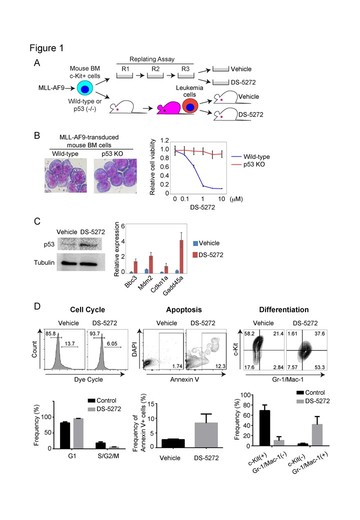- HOME
- News & Events
- Publications
- 【Publications】Antitumor immunity augments the therapeutic effects of p53 activation on acute myeloid...
Publications
【Publications】Antitumor immunity augments the therapeutic effects of p53 activation on acute myeloid leukemia
November 20 2019
Hitoshi Takizawa, Goro Sasahida
Paper information
Yasutaka Hayashi1, Susumu Goyama1, XiaoXiao Liu1, Shuhei Asada1, Yosuke Tanaka1,Tomofusa Fukuyama1, Mark Wunderlich2, Eric O'Brien2, Benjamin Mizukawa2,Satoshi Yamazaki3, Akiko Matsumoto4, Satoshi Yamasaki4, Tatsuhiro Shibata4, Koichi Matsuda5, Goro Sashida6, Hitoshi Takizawa6, Toshio Kitamura1
1Division of Cellular Therapy, The Institute of Medical Science, The University of Tokyo, Tokyo, Japan
2Division of Experimental Hematology and Cancer Biology, Cincinnati Children's Hospital Medical Center, University of Cincinnati College of Medicine, Cincinnati, OH, USA.
3Division of Stem Cell Therapy, The Institute of Medical Science, The University of Tokyo, Tokyo, Japan.
4Laboratory of Molecular Medicine, The Institute of Medical Science, The University of Tokyo, Tokyo, Japan.
5Laboratory of Genome Technology, Human Genome Center, The Institute of Medical Science, The University of Tokyo, Tokyo, Japan.
6International Research Center for Medical Sciences, Kumamoto University, Kumamoto, Japan.
Antitumor immunity augments the therapeutic effects of p53 activation on acute myeloid leukemia
Nat Commun. 2019 Oct 25;10(1):4869. doi: 10.1038/s41467-019-12555-1.
Key words: Acute myeloid leukemia, p53-MDM2 interaction inhibitor, Hif1a, PD-L1, tumor immunity
Abstract
The negative regulator of p53, MDM2, is frequently overexpressed in acute myeloid leukemia (AML) that retains wild-type TP53 alleles. Targeting of p53-MDM2 interaction to reactivate p53 function is therefore an attractive therapeutic approach for AML. Here we show that an orally active inhibitor of p53-MDM2 interaction, DS-5272, causes dramatic tumor regressions
of MLL-AF9-driven AML in vivo with a tolerable toxicity. However, the antileukemia effect of DS-5272 is markedly attenuated in immunodeficient mice, indicating the critical impact of systemic immune responses that drive p53-mediated leukemia suppression. In relation to this, DS-5272 triggers immune-inflammatory responses in MLL-AF9 cells including upregulation of Hif1α and PD-L1, and inhibition of the Hif1α-PD-L1 axis sensitizes AML cells to p53 activation. We also found that NK cells are important mediators of antileukemia immunity. Our study showed the potent activity of a p53-activating drug against AML, which is further augmented by antitumor immunity.

